In summer 2016 we supported and rode with the Pleasant Revolution bike music tour of the West Coast. Here’s an interview in which Kipchoge Spencer, the founder of the Pleasant Revolution, asks RTB’s founder Paul Freedman ( a.k.a. Fossil Fool) about the experience. The photos are Paul’s.
KS: What made you want to join the tour?
PF: I’ve been taking myself on increasingly long summer bike tours for years and have always found it to be a high point of the summer. I knew I wanted to join for week or more when I heard about it. Just to be on bike tour was my main motivation. I also wanted to back up their purchase of our pedal powered gear.
KS: How long did you ride, days/miles? From where to where?
PF: I joined the crew on Salt Spring Island in British Columbia—they were already on tour. I met them at the Farmers Market when they were setting up for a Biketopia Music Festival. I stayed with them for two weeks, until Seattle, and then joined them again on the Sonoma coast of California for another stint. I think our biggest day of riding was 50-55 miles approaching Seattle. I felt it on the train ride home, I could barely walk!I always like combining public transportation with bike touring. To meet up with them the first time, I took Amtrak to Seattle, a ferry to Victoria, B.C. and then biked from there to the Salt Spring ferry. The second time I was able to take a bus from San Francisco to the coast to meet up with them.
KS: You’ve toured with the Pleasant Revolution before, in 2010 in Spain. Except for Heather Normandale, one of the artists, this was a completely different crew this year. How did this one compare to the Pleasant Revolution that the Ginger Ninjas led?
PF: Two of the main differences were the consensus decision making process and the stated goal of it being a women led tour. (Although that seemed a little contradictory—being consensus on the one hand but “women led” on the other). In Spain I had seen you leading the tour and everyone else playing their supporting roles.
The level of difficulty seemed lower this time to me on the parts I was on. But that’s not a fair comparison because when I joined in Spain you were in the heart of the Pyrenees and had been riding for months.
There were a lot of first time riders, folks who’d never been on a bike tour before, who began as musicians much more than bike riders. A really strong value was that the tour be a group uplifting process. It was more nurturing and focused on empowerment of every rider.
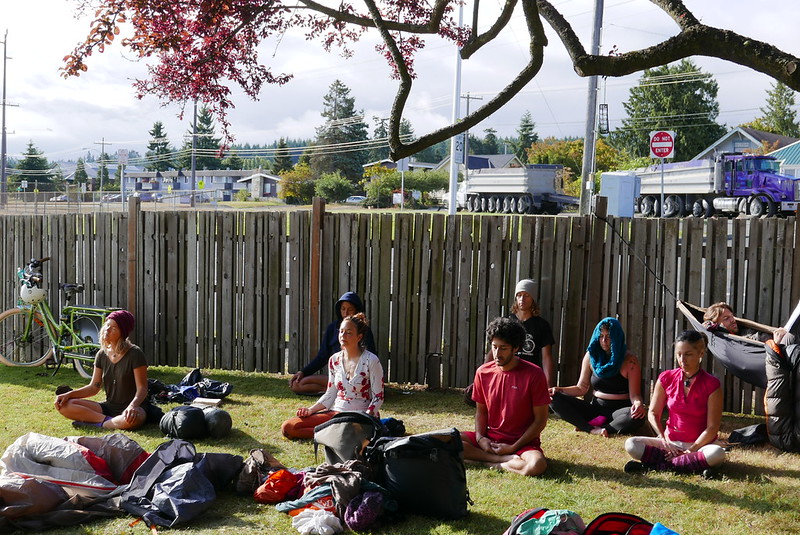
Daily meditation practice in Port Angeles. Note the huge logging truck!
I felt that in the participation at the shows, where there was a strong value that everyone should have a voice and a purpose. Like, for instance, there was a dedicated MC (Nate) and there were circus elements and clowning for non-musicians (Nicky and Mega).
When I joined in Europe there were some particular days when I felt like it was a really athletic endeavor. Like the day we went probably 60 miles, mostly on dirt, through twelve pitch black old railroad tunnels and over a small mountain and I had lots of flats, too. That time I had a fully loaded cargo bike with sound equipment and group gear, and this time I had a pretty easy experience with a titanium road bike and very little group gear, since I knew the the tour had the load carrying bases covered without my help.
Playing shows in North America was really different than Europe. More organizing and pre-planning was needed here, whereas we did more impromptu gigs in Europe where we’d just show up in a city square, set up and play. I think that was both because of the personalities on this tour and the laws. This crew didn’t want to get hassled or forced to stop playing and they did the pre-work to get permission and make sure it didn’t happen.
KS: Favorite day of riding?
PF: I had a couple. The favorite moment was moving towards Port Townsend, Washington in the evening, on the 20.
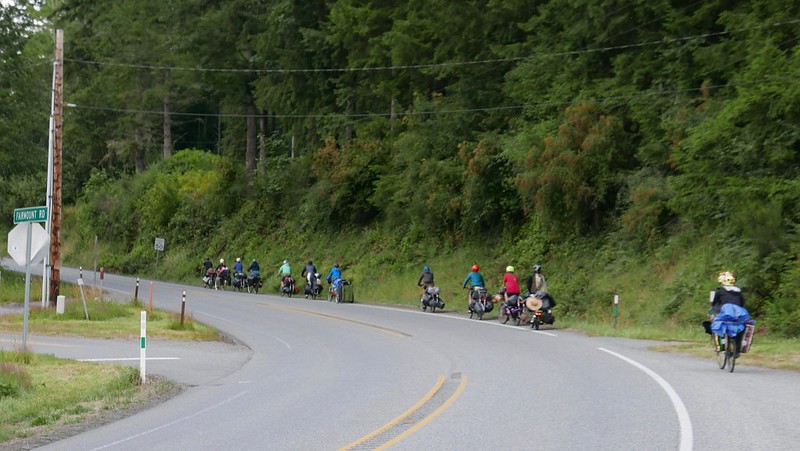
Dusk ride toward Port Townsend.
I volunteered to go in back because I had a strong taillight and we’d been warned about truck traffic on that road. The group was staying very tight, moving steadily up a 4 mile hill together. There were some big logging trucks that passed us; they were all pretty respectful but it was a big deal when we got passed as it took them a couple minutes to pass us all. During that time you’d hear them rumbling and you’d hear the group calling out to each other to stay safe. I was feeling the teamwork and the human powered nature of what we were doing, and the comparison to the fossil fuel and car culture directly to our left. Then the truck would drop out of site and we’d be riding through a quiet forest at dusk again.
KS: Hardest day or moment?
PF: There was a time in Port Townsend when I didn’t really want to be in the show environment. It was really cold, and I was wondering why we were trying (succeeding) in entertaining these five people, but as a visitor I didn’t want to be telling them what to do or trying to lead. I lost my travel wallet containing my passport and cash and I think it happened at that show somehow. But except for that one moment the whole experience lived up to the “pleasant” promise.
KS: How did it strike you that this new crew was also called the Pleasant Revolution.
PF: I had helped facilitate this by encouraging you [Kipchoge and the Ginger Ninjas] to share the name. It reminded me of the Princess Bride and the Dread Pirate Roberts and how people can step up and use a name that has certain character associated with it. I was proud of you because it’s unusual to pass a name to something or someone else, when you’ve worked hard to establish it and grow its reputation. But I thought it worked well. The group definitely boosted up the name and used it a lot, and attracted people because of it. I think it will benefit whoever uses it in the future from the point of continuity.
KS: Rock the Bike lent a new Yuba Spicy Curry mid-drive electric cargo bike to the tour. How did it perform? [Paul is a minority owner of Yuba].
PF: I had a hunch that it would be helpful. It really shined in dealing with people’s health and injuries, enabling people switch to it when they needed to. They appreciated how intuitive it was, how auto it is that it just senses effort and helps you and thus has a really simple learning curve. Other than that, it carried a very heavy load. The battery range was a little short for some of the days on tour and sometimes the primary rider, Nate the sound engineer, would stop at a cafe and add some juice and then catch up. He called this ‘adding cayenne to the curry.’ There were some times when he really had to baby it to make it all the way to camp without the battery dying. I think next time they’d bring an extra battery, which is a small amount of weight compared to what they’re already hauling. Electrically and mechanically it worked perfectly. Mixing e-bikes in with the Pleasant Revolution is a cool tradition that will probably continue. In Europe I had the [Yuba Mundo] Blue Whale and Thomas [Spellman, the Ginger Ninjas guitar player and pedal power system engineer] had the Stoke Monkey on his Big Dummy.
KS: Favorite gig?
PF: Not a gig, but a campfire jam on the Olympic Peninsula (same night as that epic hill climb I mentioned) was my fave. Gigs wasn’t my purpose for joining. Pedal powered shows often feel like work for me now, rather than expression. None had huge audiences, which is always important to me in a Pedal Powered show. I think it’s just inherently difficult to promote a show when you’re not in the town. In Spain we had nice audiences because of the dense downtowns where passerbys would just see us and stop to listen. On the West Coast it’s more spread out.
PF: The one I mentioned before, outside Port Townsend, was the one night we did pure wild camping. In was on a timber farm; we just ducked into the woods and slept under the big branches and stars. When it was time for a fire looking for wood was a joke. We were surrounded by it and making a campfire was more a matter of trying not to have wood in it. I also enjoyed being hosted by the couple who was part of the Victoria bike kitchen. In Europe when we stayed with people (versus wild camping) it was usually at squats—huge concrete floors, no cabinets or trim or heat. This tour was more pretty plush, home-wise.
KS: Did you unplug from the office or stay connected?
PF: I didn’t unplug for very long. There happened to be a pretty big sales inquiry while I was on tour, from the Democratic Convention, and I went for it with gusto, even talking to them on my headset while riding a couple times. I was excited by it while it was happening. I felt accepted by the group for doing my business even though I was the only one who wasn’t completely present with the group experience. I think people appreciated that I was overall generous with my time and energy, you know cooking, fixing bikes, and all the things that make a good Pleasant Revolutionary. I also felt good bringing in a big gig for the team back home, and I’d consider doing this again. Bike touring in general has become much more of a connected experience—the navigators this time were using Google Maps, for instance, and last summer on my Colorado tour we used YouTube to watch some ATVers’ footage to decide if we could do certain routes. Everything is just more connected now. I definitely did not try to disconnect.
KS: How did RTB support the tour?
PF: We donated a
FBU Stationary Kit to the crowdfunding campaign, loaned our Spicy Curry, gave them discounts on their system and some other stuff like cam straps, and did some customizations that were unique to the needs of the tour, like Xtracycle-specific
Roll Up generators. When the tour did a homecoming at First Friday in Oakland, RTB showed up huge and brought out a stage lighting rig, El Arbol, and a bunch of Generator Pros.
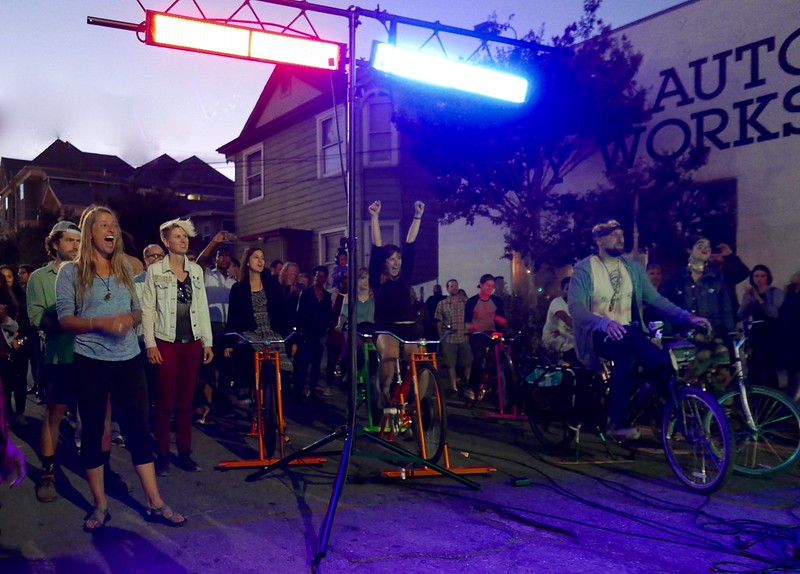
Homecoming show at First Friday
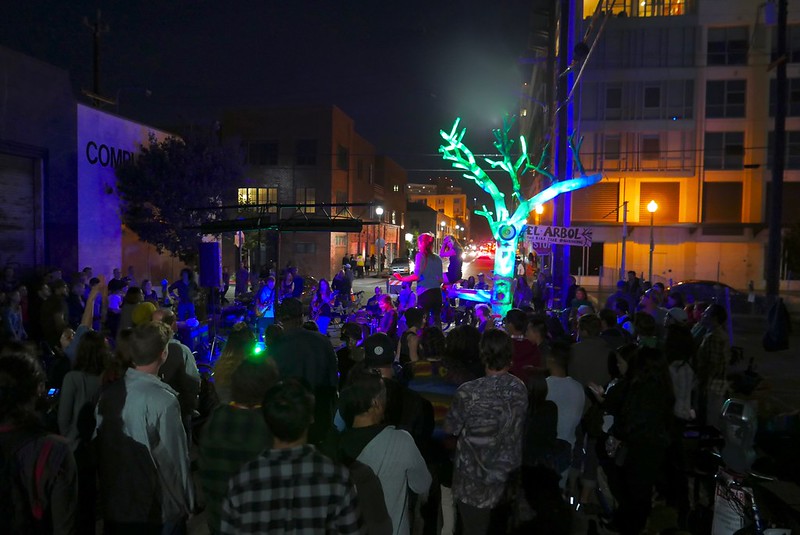
I brought out El Arbol to help draw people to the homecoming show. Note Molly on stilts!
We also took the opportunity to bring a new level of engineering into their Pedal Power Utility Box, and achieved what I think is the holy grail by combining the efficiency of the
DC-modified JBL loudspeakers with the simplicity of having everyone pedaling into the same energy bank. In the past we’ve had to have separate groups of riders for separate power inputs and that can be challenging to manage. The upgrade required a pretty fancy circuit called that we call the Decida, because it “decides” where to send any given electron coming its way from a pedaler based on which of the circuits (positive rail of DC, negative rail of DC, or AC) needs the energy at that moment.
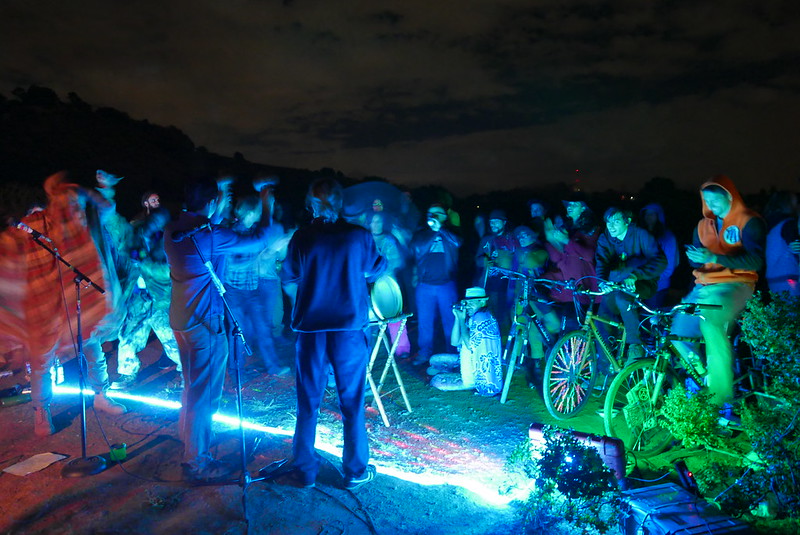
Secret hilltop sendoff party. The Utility Box is next to the first bike’s wheel. The lid (open) has a Pedalometer inside that shows people how hard to pedal.
The system was completely stable for 30 shows, the entire tour, and achieved the efficiency we were hoping for. Four people could supply all the power for a subwoofer, all the AC needs of the instruments and two 15″ speakers.
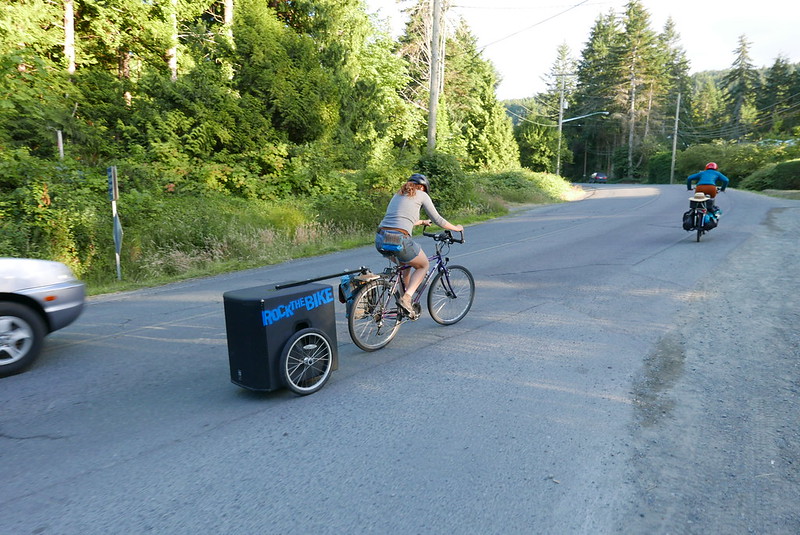
Dara towing the subwoofer, which took on the name Subrina.
It’s the first time that any band has bicycled with a subwoofer, something Adley was proud of, and it really brought the sound to a higher level than any tour to date. The fact that it still only took four bikes to power it and that it never broke down is a true milestone that would amaze anyone who’s ever been on Pleasant Revolution tour before.
KS: Why did you support the tour?
PF: I thought their motivation was pure — bringing pedal power to the people. Also Rock The Bike isn’t biking to nearly as many of our shows right now and I want to really support that as it also speaks to our roots and core principles. Also, my friends were doing it: Adley, Heather, and Carolyn, and I just wanted to support them!
KS: Does it benefit Rock the Bike?
PF: Hard to say, in terms of $ or exposure to people in the towns that we passed through. No one has said, Hey I saw you guys in Ashland and want some Pedal Power for my daughter’s school, but in terms of building and supporting the community of bike-powered artists and musicians it’s more tangible. It’s good for Rock the Bike’s name to say we’re supporting the Pleasant Revolution as it continues to evolve. To some degree I did it in faith that together somehow all of us are going to bring Pedal Power to a new place and look back on it with pride. I hope that through tours and awesome outreach and RTB’s innovation and willingness to have larger set of gear we’re going to break out and have a wider audience. Being part of the various efforts is a way of continuing that possibility.
KS: Any other inspirations? Songs? Life? Inventions?
PF: I felt inspired to create a new brand or a expand Rock the Bike to become a bike touring trainer and outfitter for people who don’t have all the gear or know-how. Like, we’d offer low carbon vacation packs with curated route maps, a lightweight tent, down sleeping bag, front packs, waterproof panniers, touring bike, etc.
I came up with a little snippet of a rap, about having a good system for where you put your stuff:
Put it where it goes,
You could lose your mind later.
Put it where it goes,
You could waste your time later.
You could make your friends mad.
Dropping what they’re doing cuz they’re trying to help you look
For that thing that’s already in your bag,
Put it where it goes!
KS: People who know you know that much of the inspiration for what Rock the Bike makes and sells has come from your personal passion for bike power, bike travel, bike community, and performing. Most of the early music-related Rock the Bike products had their origins in your and your friends’ street shows.
What’s your relationship to performing like these days?
PF: I’m definitely taking a break and not seeking the mic right now, and enjoying other forms of creativity. Technically, I’m in a migration between my Cardboard Box beat machine and the laptop and I haven’t made the full transition yet. I enjoyed performing a couple times on tour as a guest. It’s a good feeling to have memorized rhymes, to share them with the bike community and carry a messages with humor and funk.
KS: Anything else you’d like to add?
PF: The visit to the Yuba Bikes HQ in Petaluma was really sweet. It felt the way that I’d hope, wanting to link this new generation of mostly younger riders with the bike culture business community. We had a circle with the Yuba team for product feedback and mutual appreciation that made for a really sweet day. I’d like to continue doing that kind of diplomacy and advocacy.
Related






